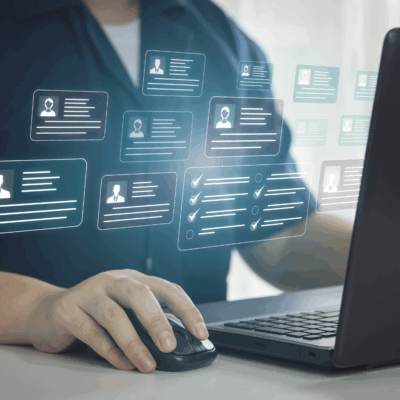Artificial Intelligence in HR: The Next Big Shift in Workforce Strategy
Artificial intelligence is rapidly reshaping industries, and HR is no exception.
Lydia Wu, Senior Director of People and Strategy at Panasonic Energy of North America, sees artificial intelligence in HR as a force akin to the Internet’s transformative impact in the early days of its adoption.
This week on America Back to Work, Lydia shared her insights on how AI is influencing HR professionals, both as an opportunity and a challenge.
Artificial Intelligence in HR: A Long-Standing but Evolving Role
While many HR professionals may feel as though AI has recently burst onto the scene, Wu points out that artificial intelligence in HR has quietly played a role for years.
“Ask any HR function, and I can guarantee you there is some form of a chatbot that currently exists in their technology stack,” she said.
Chatbots have long been used to enhance employee self-service, answering routine HR queries and reducing the burden on HR teams.
Similarly, artificial intelligence in HR has played a role in compensation planning and total rewards.
“Where do we access the data? How do we differentiate the geographic data? How do research companies turn survey data into the benchmarks that we’re using today?” Wu asks.
AI-powered compensation tools help HR professionals analyze salary trends, benefits packages, and labor market data, streamlining decision-making processes.
The Industry’s Cautious Excitement About AI in HR
Lydia describes the reaction to artificial intelligence in HR as a mix of excitement, caution, and underlying fear. While HR professionals recognize the potential of AI to drive efficiency, many are apprehensive about how it might change their roles.
“The final outcome and product can completely replace me and what I do today,” she noted.
This concern is not unfounded, but Wu believes artificial intelligence should be seen as a co-pilot rather than a replacement for human expertise.
Comparing artificial intelligence adoption to the Internet’s rise, she predicts that artificial intelligence in HR will become so embedded in daily tasks that people will eventually take it for granted. Just as employees no longer question the necessity of an Internet connection, HR teams may soon rely on AI-driven insights without a second thought.
Navigating Compliance, Ethics, and Data Integrity in AI-Driven HR
Despite its benefits, artificial intelligence adoption in HR brings legal and ethical challenges. Wu highlights the importance of data privacy and regulatory compliance, particularly in light of evolving legislation such as the EU’s artificial intelligence regulations.
“We don’t know what we don’t know,” she acknowledged, emphasizing that HR teams must proceed with caution.
One key concern is how HR teams manage data.
“AI only works when there’s massive volumes of data going into it,” Wu said.
However, biased or incomplete data can lead to flawed artificial intelligence-driven insights. Before HR teams integrate artificial intelligence, they must ensure they have a strong data foundation to avoid issues with accuracy and fairness.
Additionally, companies must be vigilant about how vendors use HR data. Lydia warns that third-party artificial intelligence providers may use client data to train their models, raising privacy concerns. HR teams must implement robust security measures and ensure compliance with evolving legal standards to mitigate risks.
Where HR Teams Should Begin with Artificial Intelligence
For organizations looking to embrace artificial intelligence in HR, Wu offers a pragmatic approach: start with the fundamentals.
“Start at the foundation, start at your data,” she advised.
AI models are only as good as the data they are trained on, so companies must invest in proper data collection and management before attempting to leverage artificial intelligence at scale.
Wu recommends that companies first implement artificial intelligence in HR in areas where it can automate repetitive administrative tasks—what she calls “tier zero” work. For example, chatbots can streamline employee inquiries, freeing up HR professionals to focus on strategic initiatives. From there, organizations can gradually expand artificial intelligence’s role to more complex decision-making processes.
The Road Ahead: AI’s Evolution in HR
Looking ahead, Wu expects artificial intelligence adoption in HR to mirror the trajectory of people analytics a few years ago. Artificial intelligence in HR will become a more common topic of discussion, but widespread adoption will take time. In the next 12 to 18 months, she predicts that most HR teams will experiment with artificial intelligence in small ways, such as enhancing self-service tools and streamlining administrative tasks.
However, Lydia also acknowledges that HR professionals will likely become more comfortable with artificial intelligence in their personal lives before fully integrating it into their work. As consumer adoption of artificial intelligence-powered tools increases, demand for similar efficiency in workplace technology will grow.
Ultimately, Wu sees artificial intelligence in HR as a powerful tool that will augment, rather than replace, human expertise.
“Let the technology do most of the routine heavy lift, but always make sure there is a person in place,” she advises.
Artificial intelligence’s true value in HR lies in its ability to free professionals from repetitive tasks, allowing them to focus on the human-centric aspects of their work.
The Future of Artificial Intelligence in HR
Wu’s insights offer a balanced perspective on artificial intelligence’s role in HR—acknowledging both its potential and its challenges.
As technology continues to evolve, HR professionals must stay informed, build strong data foundations, and strategically integrate artificial intelligence where it adds value. Those who take a thoughtful, measured approach will be best positioned to leverage artificial intelligence’s capabilities while maintaining the human touch that remains central to HR.







